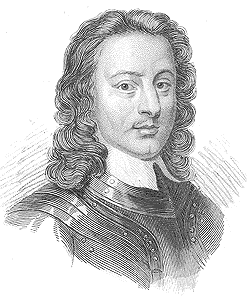
RBH Home
Maps & Travels
Articles
Legends
Towns & Villages
Castles & Houses
Churches
Biographies
Gentry
Family History
Odds & Ends
Mail David
John Hampden (1595-1643)
Background
 John
Hampden, one of the most distinguished of the patriots of England, was the
head and representative of an ancient and opulent family which had
received the lands of Great Hampden in Buckinghamshire from the reign of
Edward the Confessor. They boasted to have transmitted its wealth, honours
and influence, unimpaired and increasing, in direct male succession, down
to this the most illustrious name of the house. He was the eldest son of
William Hampden of Great Hampden and of his wife, Elizabeth, second
daughter of Sir Henry Cromwell, of Hinchinbrooke in Huntingdonshire, and
aunt of the Protector, Cromwell. John Hampden was born in London in 1594
and, at the age of three years, came, by the death of his father, into
possession of the family estates which, besides the ancient seat and
extensive domain in Buckinghamshire, comprehended large possessions in
Essex, Oxfordshire and Berkshire. He was brought up at the free
grammar-school of Thame in Oxfordshire, entered as a commoner at Magdalen
College, Oxford in 1609 and was admitted student of the Inner Temple in
1613, where he made considerable progress in the knowledge of common law.
His classical attainments also seem to have been respectable, since he was
associated, oddly enough, with Laud, then Master of St. John's, in writing
the Oxford gratulatory poems on the marriage of the Elector Palatine and
the Princess Elizabeth. From this union sprang Prince Rupert who led the
Royalist troops when Hampden received his death-wound. In 1619 he married,
at Pyrton in Oxfordshire, his first wife, Elizabeth Symeon, only daughter
of Edward Symeon. Inheriting a noble property, he devoted himself
principally to the business and amusements of a country life, without
suffering his literary habits to fall into desuetude. Lord Clarendon says
that he "retired from a life of great pleasure and license, to
extraordinary sobriety and strictness, and yet retained his usual
cheerfulness and affability." His first entrance into public life was
in January 1621, when he took his seat in the Parliament then convened,
for Grampound in Cornwall, at that time a borough of wealth and
importance. He also sat in the Parliament 1624 and was active and diligent
in his attendance, and intimately connected himself with Selden, Pym, St.
John and other leaders of the popular party. Though he seldom spoke, his
capacity for business was known and respected, as appears from the
employments in committees and conferences imposed on him by the House.
John
Hampden, one of the most distinguished of the patriots of England, was the
head and representative of an ancient and opulent family which had
received the lands of Great Hampden in Buckinghamshire from the reign of
Edward the Confessor. They boasted to have transmitted its wealth, honours
and influence, unimpaired and increasing, in direct male succession, down
to this the most illustrious name of the house. He was the eldest son of
William Hampden of Great Hampden and of his wife, Elizabeth, second
daughter of Sir Henry Cromwell, of Hinchinbrooke in Huntingdonshire, and
aunt of the Protector, Cromwell. John Hampden was born in London in 1594
and, at the age of three years, came, by the death of his father, into
possession of the family estates which, besides the ancient seat and
extensive domain in Buckinghamshire, comprehended large possessions in
Essex, Oxfordshire and Berkshire. He was brought up at the free
grammar-school of Thame in Oxfordshire, entered as a commoner at Magdalen
College, Oxford in 1609 and was admitted student of the Inner Temple in
1613, where he made considerable progress in the knowledge of common law.
His classical attainments also seem to have been respectable, since he was
associated, oddly enough, with Laud, then Master of St. John's, in writing
the Oxford gratulatory poems on the marriage of the Elector Palatine and
the Princess Elizabeth. From this union sprang Prince Rupert who led the
Royalist troops when Hampden received his death-wound. In 1619 he married,
at Pyrton in Oxfordshire, his first wife, Elizabeth Symeon, only daughter
of Edward Symeon. Inheriting a noble property, he devoted himself
principally to the business and amusements of a country life, without
suffering his literary habits to fall into desuetude. Lord Clarendon says
that he "retired from a life of great pleasure and license, to
extraordinary sobriety and strictness, and yet retained his usual
cheerfulness and affability." His first entrance into public life was
in January 1621, when he took his seat in the Parliament then convened,
for Grampound in Cornwall, at that time a borough of wealth and
importance. He also sat in the Parliament 1624 and was active and diligent
in his attendance, and intimately connected himself with Selden, Pym, St.
John and other leaders of the popular party. Though he seldom spoke, his
capacity for business was known and respected, as appears from the
employments in committees and conferences imposed on him by the House.
